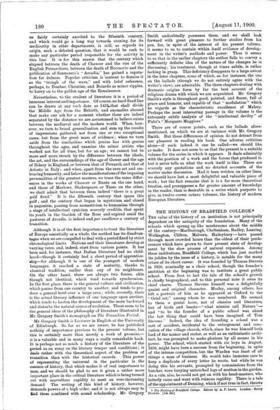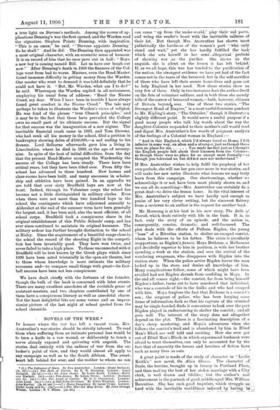THE HISTORY OF BRADFIELD COLLEGE.* THE value of the history
of an institution is not principally dependent on the antiquity of the foundation. Many of the schools which sprang up like mushrooms about the middle of the century—Marlborough, Cheltenham, Radley, Lancing, Wellington, Clifton, Malvern, Haileybury — have passed through more crowded hours than the oldest of their prede- cessors which have grown to their present state of develop- ment by the slow process of natural expansion. Among these institutions, Bradfield College, which has just marked its jubilee by the issue of a history, is notable for the many crises of its short career. It was founded by Thomas Stevens in 1850, nominally as a choir school, though the founder's ambition at the beginning was to institute a great public school. From first to last the tale of the school's growth is chiefly biographical, and to this personal note it owes its chief charm. Thomas Stevens himself was a delightfully quaint and original character. Mozley, among others, has left a portrait of him as he appeared at Oxford to the "One! set," among whom he was numbered. He seemed to them a genial lover, not of classics and literature, but of birds and beasts—" what ninnies call Nature "— and "to be the founder of a public school was about the last thing that could have been imagined of Tom Stevens." Indeed, the idea of founding a school was a sort of accident, incidental to the enlargement and reno- vation of the village church, which, since he was himself both lord of the manor and rector, as well as an enthusiastic archi- tect, he was prompted to make glorious by all means in his power. The school, which started with six boys in August, 1850, might have been a success from the beginning, in spite of the intense competition, but the Warden was least of all things a man of business. He would take immense care to keep a duplicate of every letter he wrote, but while he was doing this his servants, prompted by commission's from the butcher, were burying untouched legs of mutton in the garden. As a rule, also, he could not get on with his head-masters, who latterly came and went with ruinous rapidity. There is a tale of the appointment of Denning, which if net true in fact, throws
* The History of Bradfi.d bUega Edited by A. F. Leach. London: Henry a true light on Stevens's methods. Among the scores of ap- plications Denning's was the:first opene& and the Warden reed- the -signature, Stephen Points - Denning, with inspiration. "This is an omen," lie said; " !Stevens appoints Denning.' So-he iihalL'? -And he did: - The Denning then appointed was a nibSt -origihEil .charader; with an-eceentric sense of humour. It ig cin record of,hira• that-he once gave 'out in hall: "Boys. a new boy is -coming named Bill. Let us have our laugh out now." • After-Denning's death in 1868 the finances of the Col- lege went from bad to: worse. Masters; even the Head4afaster, found immense difficulty in getting money-from the Warden: One master who went to demand- it was told definitely that he could not hare it. But, Mr. Warden, what am I to do ? " he said. Whereupon the Warden replied in all seriousness, employing his usual form of address : "Read the Nicene Creed, my dear. When I have been in trouble I have always found great comfort in the Nicene -Creed." The tale may perhaps be taken to illustrate the Warden's views of religion. He was fond of the phrase "true Church principles," and it may be to the fact that these have prevailed the College owes no small part of its ultimate success. But the signal for that success was the inauguration of a new regime. The inevitable financial crash came in 1881, and Tom Stevens, who had sunk all his money in the school, filed a petition in bankruptcy showing debts of 2100,000,—a sad ending to his dreams. Lord Selborne afterwards gave him a living in Lincolnshire, where he died in 1888, at the age of seventy- nine. In spite of the host of initial difficulties, from the day that the present Head-Master accepted the Wardenship the success of the College has been !steady. There have been critical years, but they have been tided over. From fifty the school has advanced to three hundred. New houses and class-rooms have been built, and many successes in scholar- ship and athletics have been gained. In an appendix we are told that over . sixty Bradfield boys are now at the front. Indeed, through its Volunteer corps the school has become not a little distinguished in military circles. Even when there were not more than two hundred boys in the school, the contingents which have adjourned annually to Aldershot at the end of the summer term have been generally the largest, and, it has been said, also the most efficient, of all school corps. Bradfield took a conspicuous share in the original establishment of this Public Schools' camp, and has ever since continued to maintain its original keenness. The military ardour has further brought distinction to the school at Bisley. Since the acquirement of a beautiful range close to the school the record of the shooting Eight in the competi- tion has been invariably good. They have won twice, and never failed to take a high place. To those unconnected with it Bradfield will be hest known by the Greek plays which since 1890 have been acted triennially in the open-air theatre, but to those whose knowledge is more intimate the military successes and—to compare small things with great—its foot- ball success have been not less conspicuous.
We have dealt. chiefly . with the fortunes of the founder, though the bulk of the book is concerned with later events. There are many excellent anecdotes of the irritabile genus of assistant-masters, and two chapters contributed by one of them have a conspicuous literary as well as anecdotal charm. Not the least delightful bits are some verses and an impres- sionist picture of the last night at school quoted from the school chronicle.



































 Previous page
Previous page